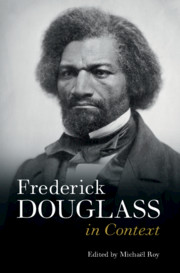Book contents
- Frederick Douglass in Context
- Frederick Douglass in Context
- Copyright page
- Contents
- Illustrations
- Contributors
- Chronology
- Abbreviations
- Introduction
- Part I Places
- Part II Genres
- Part III Activism
- Part IV Philosophy
- Chapter 17 Politics
- Chapter 18 Law
- Chapter 19 Education
- Chapter 20 Religion
- Chapter 21 Science and Technology
- Chapter 22 Environment
- Part V Networks
- Part VI Afterlives
- Further Reading
- Index
Chapter 18 - Law
from Part IV - Philosophy
Published online by Cambridge University Press: 16 June 2021
- Frederick Douglass in Context
- Frederick Douglass in Context
- Copyright page
- Contents
- Illustrations
- Contributors
- Chronology
- Abbreviations
- Introduction
- Part I Places
- Part II Genres
- Part III Activism
- Part IV Philosophy
- Chapter 17 Politics
- Chapter 18 Law
- Chapter 19 Education
- Chapter 20 Religion
- Chapter 21 Science and Technology
- Chapter 22 Environment
- Part V Networks
- Part VI Afterlives
- Further Reading
- Index
Summary
In 1851, Frederick Douglass publicly challenged the position of William Lloyd Garrison and the American Anti-Slavery Society that the U.S. Constitution was a proslavery document. As an enslaved child, the self-taught Douglass had identified literacy as “the pathway from slavery to freedom.” The same insight prompted the mature author and editor to part ways with Garrisonian moral suasionists in order to join “legal suasionists” like antislavery constitutionalist lawyers Lysander Spooner and William Goodell. From the 1840s through the 1890s, Douglass promoted the legal literacy of everyday African Americans (free and enslaved) while developing his own legal-critical analysis of American racism. Committed to wielding the “forms of law and . . . rules of hermeneutics” on behalf of freedom and equality, Douglass tirelessly challenged the increasingly biopolitical orientation of post-Reconstruction legislation and jurisprudence. From slavery to mass incarceration, Douglass insisted, racism is incompatible with the rule of law.
Keywords
- Type
- Chapter
- Information
- Frederick Douglass in Context , pp. 220 - 231Publisher: Cambridge University PressPrint publication year: 2021

